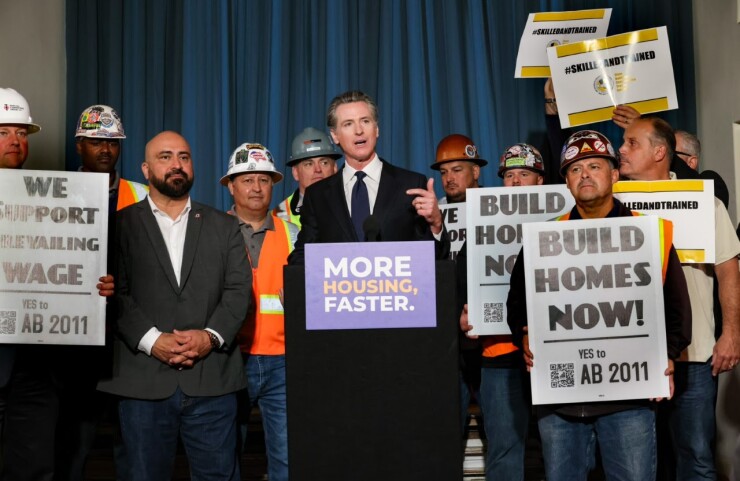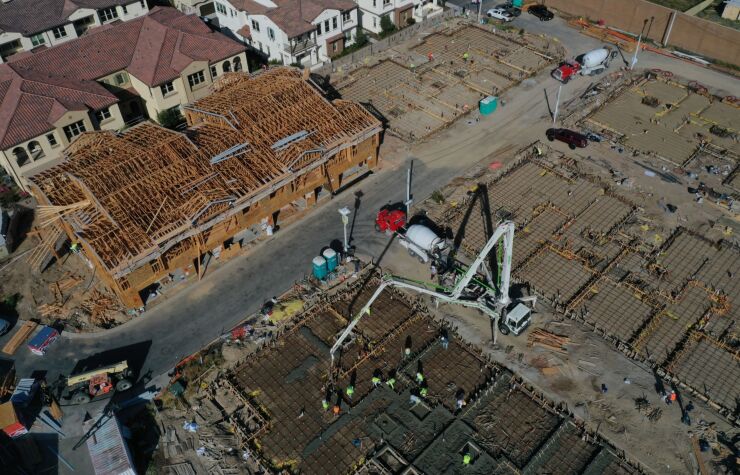California Gov. Gavin Newsom has signed a legislative package that state lawmakers hope will help turn the corner on the state's housing crisis.
He signed the package of
Newsom said the bills will accelerate the construction of new housing while also creating thousands of high-paying jobs.

"This is a moment on a journey to reconcile the original sin of the state of California, and that's the issue of housing and affordability," Newsom said.
"I think I ran for mayor of San Francisco making the point that there are more dogs in San Francisco than children, because we could not afford to raise children in the city and county of San Francisco," said Newsom, who was that city's mayor from 2004 to 2011.
"California has made historic investments and taken unprecedented actions to tackle the state's housing crisis over the past four years," Newsom said. "But we recognize there's more work to do – this package of smart, much-needed legislation will help us build new homes while rebuilding the middle class."
The state and major cities have
It also
High housing prices may drag the state's overall economy by encouraging outmigration to lower-cost states; S&P Global Ratings views high housing prices
Newsom has
"I have 400 bills on desk and less than 72 hours to go," Newsom said. "I will be working on that when I get back to Sacramento."
There is no one to blame for California's housing shortfall, Newsom said, "but ourselves. It happened on our watch, all of us."
Newsom said the agreement represented by the housing legislation represents a stride forward in which both the state and cities are accountable for working toward a solution.
Two of the most hard-fought bills, Senate Bill 6, authored by state Sen. Anna Caballero, D-Merced, and Assembly Bill 2011, introduced by Assemblymember Buffy Wicks, D-Oakland, allow underutilized commercial properties to be converted into housing, partly by rezoning commercial and office space for housing.
Both bills guarantee union-scale wages and promise an expedited construction process, while keeping development close to city centers to help the state meet its environmental goals and avoid sprawl.
They were signed by Newsom following an unprecedented deal between unions, developers and affordable housing groups.
The State Building and Construction Trades Council of California backed SB 6, along with builders and business groups, while the California Conference of Carpenters and the Service Employees International Union of California, broke from other labor groups, to support AB 2011. Ultimately, a coalition of lawmakers brokered agreements on both measures.
State and local leaders as well as union leaders spoke in favor of the efforts during the event.

"The housing crisis threatens the long-term viability of our state," said Senate Majority Leader Mike McGuire. "It's a threat to California's economy, which is fifth largest in the world."
He said 78% of extremely low-income Californians pay more than half of their income toward rent, and only about 25% of Californians can afford to buy a home in the state.
"We know this isn't sustainable," McGuire said. "This morning represents a turning point. This legislation will drive down the cost of development and revitalize urban centers in downtowns. It will create thousands of jobs that will pay families sustainable wages."
The agreement would not only bring new housing, but help replace retail jobs lost as shopping centers have faltered, Caballero said.
"The shopping centers are closing in the Central Valley and nothing will replace that, but I am pleased with this bill. It will put people to work," Caballero said. "It is also a commitment to building in a way that is sustainable and creates walkable villages. These were tough votes, but both of us appreciate those votes."
It's not okay that California has one of the lowest home ownership rates in the country, nor that 163,000 homeless people are on the streets every night, or that realtors in the Bay Area tell potential homeowners to "drive until you qualify; that should not be their motto," Wicks said.
"It is not fair that teachers are driving four hours and beyond Oakland to their homes," Wicks said.
"It contributes to climate change, and it's not good for the city of Oakland and other communities that teachers can't spend time in," Wicks said.
"That is why I worked to create a coalition around AB 2011," she said.
Newsom also announced $1 billion in awards to 30 shovel-ready projects through the California Housing Accelerator, funding expected to finance 2,755 new homes for Californians.
The governor fielded questions from reporters, including one asking what had become of his 2018
"When I announced that goal, I didn't say it was a promise, I said it was a challenge to solve," Newsom said.
Newsom called 3.5 million a stretch goal based off what a McKinsey & Co. report had indicated was needed to solve the state's housing crisis.
"This analysis done by McKinsey said that was the number needed to solve the problem. I said it was a stretch goal, and it is a goal we are in the process of trying to achieve," Newsom said.
Within the first six months of this year, Newsom said the state has permitted more than 200,000 units, the largest number since 2006, and the state is just winding up "and I am enthusiastic."
He also said that since he took office the state has approved $14 billion in funding to further efforts toward solving the housing crisis.
"Michelangelo said the biggest risk is not that you aim too high and miss, it's that we aim to low and achieve it," Newsom said.





